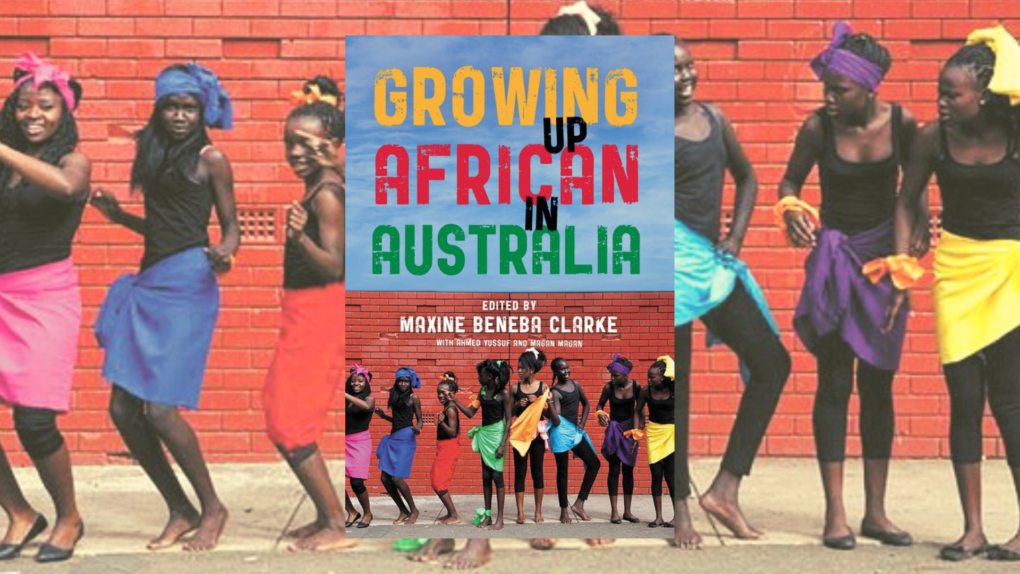
Edited by Maxine Beneba Clarke, with Magan Magan and Ahmed Yussuf, Growing Up African in Australia is a new anthology from Black Inc., following on from Alice Pung’s Growing Up Asian in Australia, Benjamin Law’s Growing Up Queer in Australia and Anita Heiss’ Growing Up Aboriginal in Australia. Whilst, Carly Findlay, who also contributed to this collection, will edit Growing Up Disabled in Australia, with a due date to be announced.
Following the format of past works, submissions were accepted from people across the African diaspora, and the end result is an anthology filled with extraordinary prose, heartfelt poetry, and fascinating interviews, all exploring the lived experiences of African-Australians.
Divided into Roots, The Playground, Welcome to Australia, The Body, Changemakers, and Dhaqan Celis, a Somali term used to describe Somalians who have forgotten where they come from, this broad collection is made up of stories from Ghana, Egypt, Somalia, Zimbabwe, South Africa, and more. The contributors are refugees, activists, actors, authors, dancers; they are the children and grandchildren of immigrants or first-generation immigrants themselves; they are Christian, Muslim, or of no religion at all. There are recurrent themes, of course – grief, struggles with identity, and racism both overt and covert chief amongst them – but no two stories are the same.
It’s perhaps prudent to warn any white readers that this is not, nor should it be read as, inspiration porn. Yes, there are stories of resilience and strength. Yes, there is war and poverty and discrimination. And, yes, there is still much the white community should be doing to help. But, these memories are expressed with pride, power, and not an ounce of self-pity. Growing Up African in Australia is, like the anthologies that have come before it, an opportunity for those of us with certain privileges to sit down and listen for a change, to discover exactly what it is we should be doing to make another’s life a little easier, and to hear it directly from their own mouths.
A particularly moving highlight is Nyadol Nyuon’s “Her Mother’s Daughter”, an examination of the murdered guerrilla leader father she never knew and the mother who chose the safety of her children over a political career in Sudan. Looking at the life her mother had before the move to Australia, Nyuon writes: “Many people assume that everyone wants to come to Australia. I have wondered whether my mother ever wanted to.” It’s an idea that transcends the unfairly different standards we have for immigrants; it is accepted that my parents came here to help me succeed, why shouldn’t it be true for a Sudanese mother, especially as the danger is infinitely more immediate and real?
Another excellent read is “Complex Colour”, in which the aforementioned Carly Findlay discusses the experiences both she and her mother have faced in Australia because of the colour of their skin. Findlay has a rare skin condition named Ichthyosis, and her mother is a dark-skinned South African, who illegally courted Findlay’s white father under the apartheid regime. Findlay, who does so much for the visibility of disabled Australians, writes thoughtfully and eloquently about reconciling her red skin with that of her mixed-race parents. It’s an interesting and, honestly, rather heartbreaking struggle, with Findlay eager to call out the injustices she sees, but still unsure as to whether she qualifies as a woman of colour.
I could go on, as there are so many stand-out pieces, but I’ll just mention one more: Inez Trambas’ “Negro Speaks of Books”. Trambas writes of her involvement in the global #bookstagram community, and how she has turned her Instagram account into a place dedicated to celebrating and sharing black and feminist literature with her followers around the world. I’m probably a little biased towards this one because, well, I’m a book reviewer and avid reader (and, yes, bookstagrammer) myself, but “Negro Speaks of Books” (also the name of Trambas’ Instagram account) explores the ideas of finding yourself in literature, the importance of representation in allowing that to happen, and the power inherent in dismantling the canon of dead white writers. It also speaks to the communities we can build online, which often help us when we’re most alone, something which many of the contributors to this collection felt (and sometimes still feel) living in Australia.
It’s no secret that Australia is a country that struggles with its own non-white heritage. Aboriginal people being given the right to vote and finally being included in the census in the 1960’s are events well within living memory, as are the White Australia policies that lingered until the early 1970’s. And today, with the continued focus on “African gangs”, and the hateful rhetoric that surrounds many non-white arrivals to Australian shores, things don’t seem to have changed much.
As a result, Growing Up African in Australia is almost painfully timely. It is an anthology that speaks to the richness of a diaspora that is all too often deprived of its nuances, distilled down simply to “Africans”, rather than the vastly different nationalities that make up that large, diverse and vibrant continent. Lively, moving, and often deeply affecting, much is packed into these short glimpses into people’s lives and, like the collections before it, Growing Up African in Australia is an absolute must-read.
![]()
![]()
![]()
![]()
![]()
FOUR AND A HALF STARS (OUT OF FIVE)
Growing Up African in Australia is available now through Black Inc.
